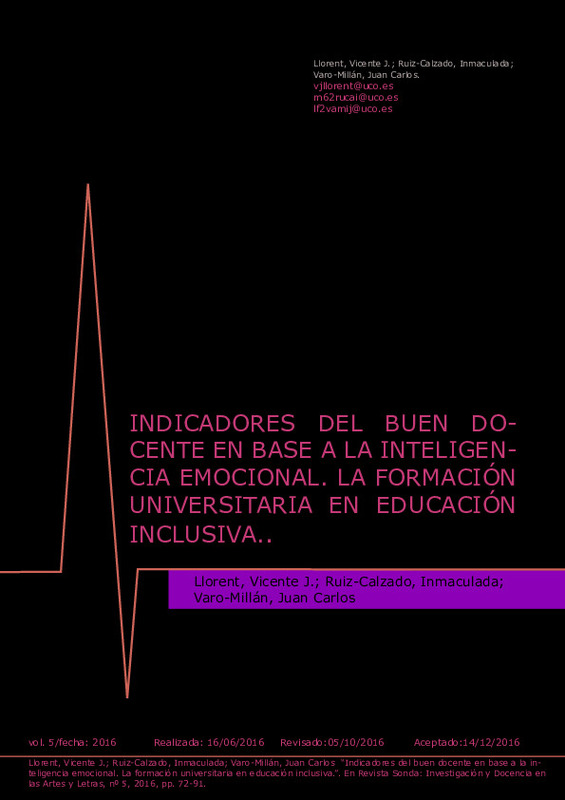AGUILAR, A. et al. Adaptación y estudio psicométrico del EPQ-R. Anuario de Psicología, 46: pp.101-118, 1990.
ARKIN, H. y COLTON, R. Tables for stadisticians, New York, Barnes & Noble, 1962.
BAR-ON, R. The Emotional Quotient Inventory (EQ-i): A test of emotional intelligence. Toronto, Multi-Health Systems, 1997.
[+]
AGUILAR, A. et al. Adaptación y estudio psicométrico del EPQ-R. Anuario de Psicología, 46: pp.101-118, 1990.
ARKIN, H. y COLTON, R. Tables for stadisticians, New York, Barnes & Noble, 1962.
BAR-ON, R. The Emotional Quotient Inventory (EQ-i): A test of emotional intelligence. Toronto, Multi-Health Systems, 1997.
BOOTH, T. y AINSCOW, M. Index for inclusion: Developing learning and participation in schools, Bristol, CSIE, 2002.
BORING, E. G. Historia de la Psicología Experimental. México, Trillas, 1985.
ESCOLAR, V. Aportaciones al uso del cuestionario de Eysenck (EPQ) para adultos en la población española. Comunicación Psiquiátrica, 8: pp.267-331, 1981.
EYSENCK, H.J. The scientific study of personality, Londres, Routledge & Kegan Paul, 1952.
EYSENCK, S.B.G. et al. Cros-cultural study of personality: Canada and England. Personality and Individual Differences, 14:pp. 1-9, 1985. En H. J. EYSENCK, y P. BARRETT: A revised version of the Psychoticism scale, Personality and Individual Differences, 6: pp. 21-29, 1985. https://doi.org/10.1016/0191-8869(85)90026-1
EXTREMERA, N. FERNÁNDEZ-BERROCAL, P. Y DURÁN A. Inteligencia emocional y burnout en profesores. Encuentros en Psicología Social, 1:260-265, 2003. https://doi.org/10.35362/rie3334005
FERNÁNDEZ-BERROCAL, P. y RUIZ, D. La Inteligencia emocional en la Educación. Revista Electrónica de Investigación Psicoeducativa, 6(2): p. 421-436, 2008.
GALTON, F. Typical Laws of Heredity. Nature (15):pp. 492-495; 512-514; 532-533, 1977.
GARDNER, H. Estructuras de la mente: la teoría de las Inteligencias Múltiples. Colombia, Fondo de Cultura Económica, 1983.
GOLEMAN, D. Inteligencia Emocional. Barcelona, Kairós, 1995.
GONZÁLEZ, M. et al. Los problemas de transición y el abandono de los estudios universitarios. Conferencia Internacional de Orientación, Inclusión Social y Desarrollo de la Carrera (A Coruña, 2004).
HERNÁNDEZ, R., FERNÁNDEZ, C. y BAPTISTA, P. Metodología de la investigación, México, MacGraw-Hill, 2000. KELLY, J. Entrenamiento de las Habilidades Sociales. Bilbao, Biblioteca de la Psicología, 1992.
LEUNER, B. Praxis der Kinderpsychologie und Kinderpsychiatrie. Emotional intelligence, 15 (6): 196-203, 1966.
LYNN, R. Cross-cultural diffrences in Neuroticism, Extraversion and Psychoticism. En Lynn, R. (ed.), Dimensions of personality: papers in honour of H.J. EYSENCK., Oxford, Pergamon Press, 1981.
MAYER J. y SALOVEY P. Emotional intelligence and construction and regulation of feelings. Applied Preventive Psychology, 4(3):197-208, 1995. https://doi.org/10.1016/S0962-1849(05)80058-7
MEARNS, J. y Cain, J.E. Relationships between teachers' occupational stress and their burnout and distress: roles of coping and negative mood regulation expectancies. Anxiety, Stress and Coping, 16: 71-82, 2003. https://doi.org/10.1080/1061580021000057040
PAYNE, W. L. A study of emotion: Developing emotional intelligence, selfintegration, relating to fear, pain, and desire. Dissertation Abstracts International, 47: 203, 1986.
PERANDONES, T.M., CASTEJÓN, J.L. Estudio correlacional entre personalidad, inteligencia emocional y autoeficacia en profesorado de Educación Secundaria y Bachillerato. V Congreso Internacional Educación y Sociedad (Alicante, 2007).
PINELO, F. T. Estilos de enseñanza de los profesores de la carrera de psicología. Revista Mexicana de Orientación Educativa, 5 (13):pp. 17-24, 2008.
PRITCHARD, D. F. I. An Investigation into the Relationship of Personality Traits and Ability in Modern Languages. British Journal of Educational Psychology, 22: pp.147-8, 1952. https://doi.org/10.1111/j.2044-8279.1952.tb02817.x
SALOVEY, P. y MAYER, J. D. Emotional intelligence. Imagination, Cognition and Personality, 9:185-211, 1990. https://doi.org/10.2190/DUGG-P24E-52WK-6CDG
SALOVEY, P. HSEE, C. K. y MAYER, J. D. Emotional intelligence and the self-regulation of affect. Century Psychology Series, 1993.
SALOVEY, P. y MAYER, J.D. Practicar un Estilo de Afrontamiento Inteligente: La Inteligencia Emocional y el Proceso de Afrontamiento. Conferencias Binacionales de Inteligencia Emocional (Acapulco, 1997).
SMART, J. C., ELTON, C. F. y BURNETT, C. W. Underachievers and overachievers in Intermediate French. Modern Language Journal, 54: pp.415-22, 1970. https://doi.org/10.2307/322830
STERN, W. Die Differentielle Psychologie in Ihren Methodischen Grundlagen, Leipzig, Barth, 1911.
TERMAN, L. M. The measurement of intelligence: An explanation of and a complete guide for the use of the Stanford Revision and Extension of the Binet-Simon Intelligence Scale, Boston, Houghton Mifflin Co, 1916. VAIN, P. La evaluación de la docencia universitaria: Un problema complejo. Buenos Aires, Comisión Nacional de Evaluación y Acreditación Universitaria (CONEAU), 2002.
VARO-MILLÁN, J.C. y LLORENT, V.J. Currículum y atención a los alumnos con las altas capacidades en la educación obligatoria. Estudio comparado entre España y Reino Unido. XIV Congreso Nacional y I Iberoamericano de Educación Comparada, 2014.
VIGOTSKY, L. S. Pensamiento y lenguaje, Barcelona, Paidos, 1995.ZABALZA, M.A. Conferencia sobre Competencias docentes (09/02/2005, Pontificia Universidad Javeriana de Cali).
[-]








